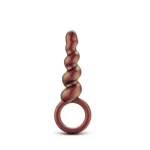Cranston, RI, USA, November 30, 2021 -/ExPressRelease UK/- Two powder horns dating to the American Revolution and earlier sold for a combined $66,420 and a silver Captain Isaac Hull presentation medal from 1812 knocked down for $40,590 in Bruneau & Co. Auctioneers’ fall Historic Arms & Militaria auction held on November 20th, online and live in the Cranston gallery located at 63 Fourth Avenue.
It was just the second such auction conducted by Bruneau & Co.’s newly formed Arms & Militaria department, headed up by director Joel Bohy. “It was great to see so many faces in the gallery and the bidding was active and lively,” Mr. Bohy said. “We sold some wonderful historic items which did very well. After researching them it was nice to see them go off to new homes.”
The sale was packed with over 500 items focusing on the French & Indian War, American Revolution, Civil War, World Wars I and II and modern firearms. “It was a fantastic sale with strong results,” said Bruneau & Col president Kevin Bruneau. “I was happy that the Hull medal found a home at a New England institution where patrons can enjoy it for years to come.”
He was referring to lot 75: a circa 1812 silver medal presented by the US Congress to Lt. Alexander Scammel Wadsworth, for gallantry in the naval battle USS Constitution vs. HMS Guerriere. The obverse depicted Captain Isaac Hull, who received a gold version of the medal that is now in the collection of the Constitution Museum. The reverse depicted the naval battle.
Alexander Scammel Wadsworth was the son of Revolutionary War General Peleg Wadsworth. Born in 1790 in Portland, Maine, he became a midshipman on April 2, 1804, and a lieutenant on April 21, 1810. He went on to have a distinguished naval career and died on April 5, 1851. He was also the uncle of author Henry Wadsworth Longfellow.
The sale’s top lot was a Rev War powder horn from 1775, carved near the base, “The Royal Artillery” and owned by Siege of Boston minute man Thomas Smith ($44,280). The horn was marked, “Thomas Smith, His Horne Made at Brookline Fort August XV: MDCC: LXXV 1775” and had carvings of a hunter firing his musket and other scenes.
Thomas Smith was born in Rowley, Mass., in 1748. In April 1775 he marched to Boston with Captain Thomas Mighill’s company of minute men and enlisted in Colonel Samuel Gerrish’s regiment. He was stationed at Sewall’s Point in Brookline, the site of Brookline Fort where the horn was made. His enlistment ended and he returned home in December.
The other powder horn that piqued bidder interest was even older, a circa 1746 example identified to Moses Brewer, who was just 18 and serving in the Provincial militia around the time the horn was carved and marked. He later served as a captain in the French & Indian War, one of Rogers’ Rangers. The 9-inch-long powder horn went for $22,140.
Following are additional highlights from the auction. Internet bidding was facilitated by LiveAuctioneers.com, Invaluable.com, Bidsquare.com, bidLIVE.Bruneauandco.com and the mobile app “Bruneau & Co.” on iTunes or GooglePlay. Prices include the buyer’s premium.
A circa 1760 British pattern light infantry carbine with a .69 bore, having a walnut stock with a storekeeper’s stamp on the right side of the butt, assembly marks in the ramrod channel and a “10” stamped just behind the side plate, plus a brass butt plate with a small ‘8’ stamp near the tang, 57 ½ inches long (the barrel 42 inches), hit the mark for $19,680.
Other British weapons included a circa 1742 long land musket, .78 bore, 57 ½ inches long, with a storekeeper’s stamp on the right side of the butt and a brass butt plate with rack number “A/18” ($23,370); and a pattern 1757 militia (or marine) musket, .78 bore, 58 inches long, with a lock marked “EDGE/1759” on the tail, a crown over “GR” in front of the cock, and a stamped crown and broad arrow government ownership mark ($9,225).
An early 20th century South Carolina marked Dutch musket, .78 bore, 61 ¼ inches long, having a walnut stock, brass butt plate, a trigger guard marked “S. ROLFE SC,” side plate marked “J.S. ROLFE V.A,” ramrod pipes, a flat banana-shaped lock with a beveled edge, the breech of the barrel having a mark on the top center and “So. Carolina”, made $8,610.
A circa 1864 Civil War regulation painted rope tension drum, with the original rope and nine original leather ears, plus a pair of sticks, found a new home for $7,995. The drum had red-painted upper and lower hoops, a shell painted blue with eagle, shield, sunburst, and a banner marked “REGT./U.S./ INFANTRY”/ It also had brass tacks around the vent.
A pair of late 18th or early 19th century Roquel brass barrel flintlock pistols, .60 bore, having walnut stocks with checkered handles, inlayed with wire in foliate designs, with inlays in and around the butts, and inlays behind the lower ramrod pipes, brass lock plates marked “Roquel”, engraved steel cocks and a silver-plated brass trigger guard, hit $7,380.
A circa 1820-1840 U.S. militia artillery coatee having a blue plain woven light weight woolen body, red twill woven facings, collar, cuffs, and false pocket flaps, brass coat-size buttons marked “ARTILLERY” with an eagle on top of a cannon and stacked cannon balls, plus a collar lined with black velvet that had turned a brown color, rose to $5,535.
“We’ve got some amazing items coming in for the next Historic Arms & Militaria auction,” Mr. Bohy said. “We’re looking forward to presenting them in the spring” (date yet to be determined). To learn more about Bruneau & Co. Auctioneers, visit www.bruneauandco.com. Updates are posted frequently.







